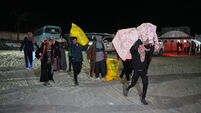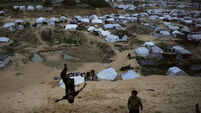The psychology of the Gaza genocide

Six-year-old Yusuf Abdurrahman Matar and his four-year-old brother Emir Abdurrahman Matar face life-threatening malnutrition amid the deepening humanitarian crisis in Gaza City, Gaza on July 25, 2025. With no access to milk, food, or basic supplies due to ongoing Israeli attacks, the two brothers struggle to survive. Picture: Getty Images
An Israeli current affairs programme this week hosted commentators mocking a Palestinian woman whose daughter had died of starvation due to the merciless siege imposed by their army. The focus of their humour was the apparent contrast between the mother’s relatively healthy appearance and her daughter’s frailty. “This is a woman who may have eaten all her child’s food. A woman who ate a whole goat, who ate the girl herself,” one scoffed, after asking for a photo of the grieving mother to be adjusted so the viewers could take a good look at her. This exchange shows how deeply dehumanised Palestinians have become in Israeli society — a necessary condition for the normalisation of genocide.
The genocide we have been witnessing for the past 21 months can overwhelm us with rage, paralyse us with despair or prompt us towards activism. Many of us are alternating regularly between these states. Almost as disturbing as the genocide itself have been the silence and complicity of our closest international allies — the EU, Britain, and the US — in the face of endless crimes against humanity. These pillars of Western democracy have lost their moral legitimacy, and with that comes apart some of our own sense of security.
















